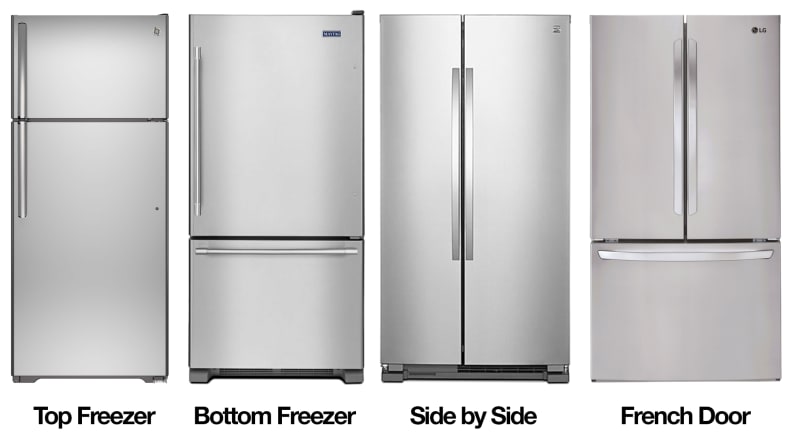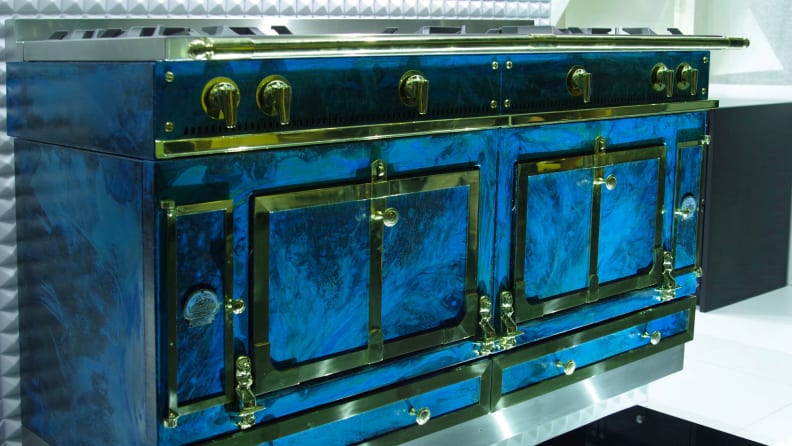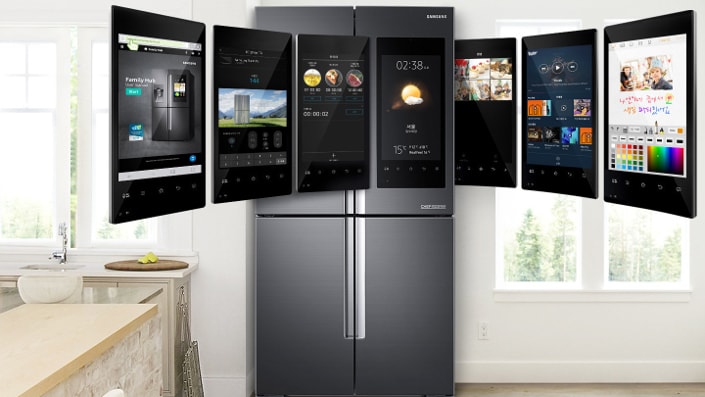10 questions you should ask before you buy an appliance
Buying a new fridge, dishwasher, range, or washer? We can help.
Products are chosen independently by our editors. Purchases made through our links may earn us a commission.
We are gathered here today to mourn the recent loss of your household appliance. After providing you with years of exemplary service, it has finally run its last wash cycle, or chilled its last leftover. You told the kids it went to live at an appliance refurbishing facility upstate.
While it can be difficult to let an old appliance go, it's for the best: Older appliances are inefficient when compared to newer models, so much so that the cost of a new unit will likely be completely recouped within the first few years of use. Chances are, though, it's been a while since you last shopped for appliances, which means the product space has likely changed dramatically since the last time you went shopping.
That's where Reviewed can help out. We've been testing and reviewing appliances for more than a decade, and we know which of the latest and greatest models are worth your money and which aren't. To help you narrow down which appliance is best for you, personally, however, you'll need to answer some questions first.
1. What’s my budget?
Your budget may be your biggest concern when you’re buying a new appliance. Decide what you want to spend on a new appliance before you shop. Depending on the appliance, prices can be separated by hundreds or thousands of dollars. Dishwashers, for example, can range in price from $300 to $2,000 or more. Fortunately, there are good appliances at a variety of price points. If your budget is generous, you can go for the top of the line, but a high price isn’t always a guarantee of quality.
Pro tip: You can often get a better deal by buying appliances in suites, which means buying a refrigerator, range, and dishwasher as a bundle. Also, check for brand rebates before you purchase.
Applies to: Any appliance
2. How much room do I need?
Before you buy, measure carefully to find out how much room you have for the new machine. While dishwashers have very set dimensions, most other appliances come in a variety of widths: It's essential to match the size of the appliance with the dimensions of the space.
Even if you’re doing a new build or total kitchen renovation, you may have constraints—for example, if the side of the room that has the water or gas hookup is narrower than the rest of the kitchen.
And remember, that new appliance is going to have to pass through your hallways and doorways before it arrives in its new location. To avoid damage during delivery, make sure you measure those spaces, too.
Pro tip: When measuring the space where the appliance will stand, don't forget to measure the depth as well as the width of the space. This can tell whether you need to buy a counter depth refrigerator to fit a shallow cut-out, or a slide-in instead of a freestanding range.
Applies to: Refrigerators, ranges
3. What’s the usable storage capacity?
You want to be able to pack as much food into your fridge as is reasonable, but looking at an image of the outside doesn't tell you much about the amount of space inside.
You can look up capacity on brand sites, but keep in mind those values are only good for rough estimates. There's no standardization for how manufacturers determine a fridge's capacity, and different manufacturers may use different measuring methods.
What is a savvy consumer to do? Well, outside of reading our reviews, viewing images of the interior can help. For most fridges, the large door bins are usually wide enough to snugly fit a gallon jug of milk: That should provide a decent point of reference that will allow you to estimate the size of the other storage options. Really, though, nothing beats heading to the show floor to check it out in person. If you want to compare scale to your appliance at home, take plenty of pictures of your appliance to bring with you, preferably with a bag or purse included for scale that you can bring to the show floor with you.
Dishwashers, washing machines, and dryers fortunately have much more straightforward capacity measurements: number of place settings and internal cubic footage, respectively. You can directly compare these measurements between different appliances of the same type.
Pro tip: Look up capacity online beforehand, then visit the appliance at a local retailer to ensure it's the right size for your family.
Applies to: Refrigerators
4. What style should I buy?

These are the four most popular types of refrigerators. There are lots of add-ons, features, and variations from here.
That depends on the style of your kitchen. Your new appliance needs to suit it in design and scale. If you have rustic farmhouse décor, a modern column fridge may clash with your aesthetic, but a classic stainless French door refrigerator may be perfect.
And take a look at your laundry room. Your washer and dryer can be gorgeous or utilitarian, depending on whether they'll live in the basement or an Insta-worthy laundry area.
But the bigger decision is whether you want to buy a front-load or top-load washer. We’ve written about the science: Front loaders are more efficient, but modern top-loaders can still do a good job, if that's your preference.
Pro tip: If you're artistic, create a mood board to help you decide whether an appliance suits the look of your kitchen or laundry area.
Applies to: Any appliance
5. What is the best appliance finish?

Luxury brands like La Cornue often make beautifully colored appliances that can add pop to a plain white kitchen.
Classic black and white will never go out of style, but there’s a world of other finishes out there.
Stainless steel has a sleek, professional look that has dominated kitchen design for the past several years. Fingerprint-resistant finishes have exploded in popularity (for good reason), bringing the feature from scarce specialty to industry standard.
If you want a fashion-forward finish and you’re willing to pay more to get it (usually about $100), black stainless steel can be your go-to. Slate, a warm gray finish unique to GE Appliances, is another alternative.
Samsung has been dramatically ramping up its finish game recently, first by releasing the warmer Tuscan Stainless finish a few years ago, and more recently by launching its new design-first Bespoke line-up of home appliances. The Bespoke line-up is a series of custom finishes that are available across product categories, so you can finally get a fridge, coffee maker, and air purifier that all match.
Companies like Smeg, BlueStar, and La Cornue also make high-end appliances in brilliant colors that can add some pop to your kitchen.
Pro tip: Every brand has a different take on black stainless steel, which can make it hard to match appliances made by different companies.
Applies to: Refrigerators, dishwashers, ranges
6. What are the new appliance features I want?

Modern appliances offer dreamy features. Make a list before you shop, keeping your budget in mind.
If you’re a serious cook, you may want a range that offers an induction cooktop or built-in, waterless sous vide.
Higher-end washers and dryers often include steam cycles.
In homes with open kitchens quiet dishwashers are a must. And who can resist a smart, door-in-door refrigerator with a tablet built into the front?
While many features can be invaluable, keep in mind that buying a washing machine with WiFi connectivity isn't a great investment if you're not planning on downloading its app. There are a ton of great appliances out there, from bare-bones to feature-filled: Don't pay extra for a feature you'll never use.
We recommend checking out a few reviews of the top products in any category that your shopping, to get a better sense of what extra features you can expect for your money.
Pro tip: Make a list of the features you want before you start shopping. Be flexible—you may have to compromise.
Applies to: Refrigerators, dishwashers, ranges, washers, dryers
7. Have I checked the look and feel?
Again, do your best to get hands-on with an appliance before you order it. What you discover can prevent you from making a mistake.
If you can’t reach the bottom of a top-load washer’s tub, you may be happier with a front loader. If a dishwasher’s door is hard to pull open, or an oven door slams shut, it could drive you crazy for years.
Your appliances should last for about 10 years, so you really want to make sure you're buying the one that feels best for you, personally.
Pro tip: Read user reviews (See #8) for comments on trouble spots.
Applies to: Refrigerators, dishwashers, ranges, washers, dryers
8. Have I read the reviews?
Visit Reviewed and other sites to read what experts have to say, and take a look at what owners think, too.
We test each appliance for a week. Users live with them for long periods of time, and sometimes issues can emerge months or years into the appliance’s lifecycle.
You should also be aware that user reviews won’t give you the full picture: People who write them are often those who had either a very positive or very negative experience.
Pro tip: If you can get a personal recommendation from friends or family, start there. That can be the most useful and personal review of all.
Applies to: Any appliance
9. What are the delivery options?
Delivery may not mean the same thing to you as it does to the retailer, especially if you’re buying from a big-box store or a direct-to-consumer brand.
Some stores consider delivery to be a drop-off in your driveway. Other retailers will bring your appliance into the home, but may charge extra for every stairway on the way to the kitchen or laundry room, or may cancel the delivery entirely if certain conditions aren't met.
If you plan to buy directly from a brand, like Samsung, check out the store’s delivery policy first.
Of course, since most damage occurs between your driveway and your home, you may prefer paying for a delivery and installation instead of taking on the responsibility yourself.
If you do have your new appliance delivered, make sure you prepare beforehand to avoid problems and be sure to inspect the appliance for damage before you sign off.
Pro tip: Measure every stairway, hallway, and doorway your appliance will need to pass through prior to delivery. And don't forget to protect your walls and floors.
Applies to: Any appliance
10. How do I dispose of an old appliance?
Before you buy your new appliance, you need to think about how you'll get rid of the old one. There are a surprising number of options available, but you'll need to decide on one in advance.
The retailer may offer a haul-away option, usually for extra cash. Some municipalities let you leave an appliance by the curb for pickup, but you still have to get it to the sidewalk.
If your appliance is in good working order, you can find a charity that will accept appliance donations. That’s a good way to update your home and someone else’s at the same time.
Pro tip: Plan ahead. Your kitchen or laundry room probably doesn’t have room for both the old appliance and the new one.
Applies to: Any appliance
The product experts at Reviewed have all your shopping needs covered. Follow Reviewed on Facebook, Twitter, and Instagram for the latest deals, product reviews, and more.
Prices were accurate at the time this article was published but may change over time.

